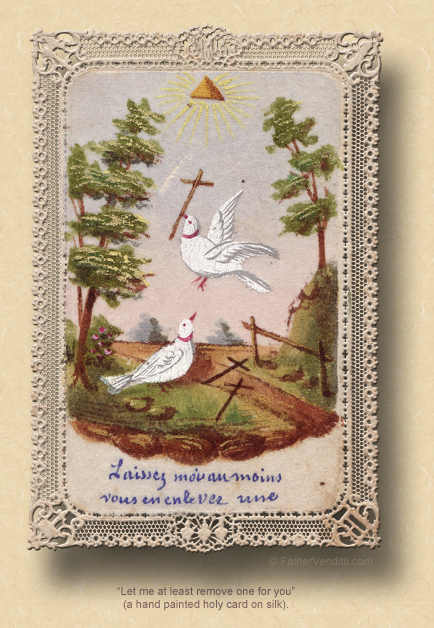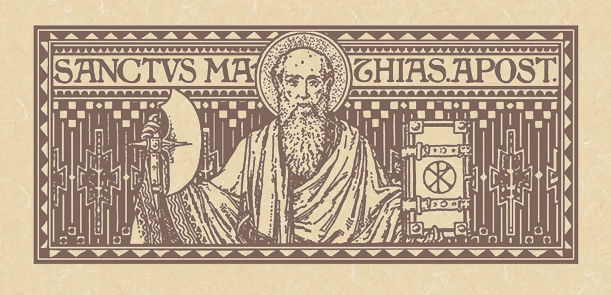Don't Worry. Be Happy.
The Feast of Saint Matthias, Apostle.
Lessons from the proper, according to the ordinary form of the Roman Rite:
• Acts 1: 15-17, 20-26.
• Psalm 113: 1-8.
• John 15: 9-17.
The Monday after the Ascension; and, the Commemoration of Saint Boniface, Martyr.*
Lessons from the dominica,** according to the extraordinary form of the Roman Rite:
• I Peter 4: 7-11.
• [The Gradual is omitted.]
• John 15: 26-27; 16: 1-4.
|
If a Mass for the commemoration is taken, lessons from the common "Protexísti…" of a Martyr during Eastertide:
• Wisdom 5: 1-5.
[or, II Timothy 2: 8-10; 3: 10-12.]
• [The Gradual is omitted.]
• John 15: 1-7.
|
FatherVenditti.com
|
 10:43 PM 5/14/2018 — Today's first lesson from the Acts of the Apostles, on the feast of the one Apostle we probably don't think too much about, shows the early Church struggling to deal with a very practical concern. Judas was one of the twelve Apostles of our Lord. As Saint Peter tells the assembled brethren,—and I’m quoting from Msgr. Knox’s translation—“Judas was counted among our number, and had been given a share in this ministry of ours” (1: 17 Knox). But after he betrayed our Lord, Judas took his own life, as you know, which left only eleven Apostles remaining; and, in his own brand of Biblical exegesis, Peter hearkens back to the words of King David, quoting Psalm 108: “Swiftly let his days come to an end, and his office be entrusted to another” (v. 8 Knox); an artificial use of Scripture to be sure; but, I'm not about to question the first Vicar of Christ on how he chooses to interpret the Old Testament. 10:43 PM 5/14/2018 — Today's first lesson from the Acts of the Apostles, on the feast of the one Apostle we probably don't think too much about, shows the early Church struggling to deal with a very practical concern. Judas was one of the twelve Apostles of our Lord. As Saint Peter tells the assembled brethren,—and I’m quoting from Msgr. Knox’s translation—“Judas was counted among our number, and had been given a share in this ministry of ours” (1: 17 Knox). But after he betrayed our Lord, Judas took his own life, as you know, which left only eleven Apostles remaining; and, in his own brand of Biblical exegesis, Peter hearkens back to the words of King David, quoting Psalm 108: “Swiftly let his days come to an end, and his office be entrusted to another” (v. 8 Knox); an artificial use of Scripture to be sure; but, I'm not about to question the first Vicar of Christ on how he chooses to interpret the Old Testament.
The bottom line is that, Saint Peter, the first Pope, had decided that Judas needed to be replaced;—whether that's justified by quoting the Psalms, Peter, I'm sure, will explain to me when I see him face to face on the day of my own judgment—and, our lesson from Acts recounts for us the process through which the Apostles chose Saint Matthias as Judas' replacement.
There is an important point here about which I think it is important for us to reflect. Why is it so important to Peter that there be twelve Apostles? Why can't the Church make due with eleven Apostles? Why can't there be thirteen Apostles, for that matter? Why not twenty-six Apostles? What's so special about the number twelve? The answer is obvious, and you know it already: there has to be twelve Apostles because Jesus chose twelve Apostles. The number of Apostles was established by Christ, Himself. And so we see, very early in the life of the Church, right on the heals of our Lord's bodily Ascension, the pattern being established by which the institution of the Church forms itself, under the leadership of the first Pope, to imitate the practice of Christ her Head.
To be sure: when Saint Paul called the Church the Body of Christ, he wasn't simply engaging in literary hyperbole; the Church is Christ, and Christ is the Church, and the Church must always do as Christ has done … and always will. No bishop, no pope, will ever be able to change that.
Now, as obvious as this sounds to you and me, you'd be surprised—I hope—to realize how many there are in the Church today who take issue with this. It’s particularly acute right now because, if you’re like me—and I pride myself on being relatively normal most of the time—you may be just a bit agitated at the fact that it seems we’re being forced to relive the ‘70s by having to think about things like women priests and contraception and divorce and remarriage and so forth; questions we thought we had disposed of a long time ago. And if that’s you, my message to you this morning is, “Don’t worry about it.” The late Cardinal Siri—who was a significant figure during the Second Vatican Council—chose as his episcopal motto on his coat of arms, Semper idem, meaning “Always the same,” from the Epistle to the Hebrews: “Jesus Christ: yesterday, today and the same, forever” (Hebrews 13: 8).
When Peter, in our first lesson today, insists that the brethren must choose a replacement for Judas so that the number of Apostles is restored to twelve, he is declaring that even he, as Pope, cannot do whatever he wants, but must act in accord with what was done by Christ, Himself. That should be a great consolation to us: that the deposit of faith, as handed down to us by Christ, can never be changed.

* After a stormy youth, Boniface was converted to the Catholic faith, suffered numerous tortures and was beheaded in the year 307.
** In the extraordinary form, on ferias outside privileged seasons, the lessons come from the previous Sunday.
|

